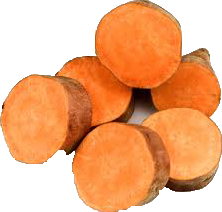|
Sweet potato is
one of the average calorie starch food (provide just 90 cal/100 g vs 70
calories/100 g of potato). The tuber, however, contains no saturated fats or
cholesterol; but is rich source of dietary fibre, anti-oxidants, vitamins, and
minerals.
Its calorie
content mainly comes from starch, a complex carbohydrate. Starch raises the
blood sugar levels slowly on comparison to simple sugars and therefore,
recommended as a healthy food supplement even in diabetes.
The tuber is
excellent source of flavonoid phenolic compounds such as beta-carotene and
vitamin A (100 g tuber provides 14187 IU of vitamin A and 8509 mcg of
β-carotene). The value is one of the highest among root vegetables category.
These compounds are powerful natural antioxidants. Vitamin A is also required
by the body to maintain integrity of healthy mucus membranes and skin. It is
also vital nutrient for vision. Consumption of natural vegetables and fruits
rich in flavonoids helps to protect from lung and oral cavity cancers.
The tubers are
packed with many essential vitamins such as pantothenic acid (vitamin B-5),
pyridoxine (vitamin B-6), and thiamin (vitamin B-1), niacin, and riboflavin.
These vitamins are essential in the sense that body requires them from external
sources to replenish. These vitamins function as co-factors for various enzymes
during metabolism.
Sweet potato
provides good amount of vital minerals such as iron, calcium, magnesium,
manganese, and potassium that are very essential for enzyme, protein, and
carbohydrate metabolism.
Sweet potato
leaves are indeed more nutritious than tuber. Weight per weight, 100 g of fresh
leaves contain more iron, vitamin C, folates, vitamin K, and potassium but less
sodium than the tuber.
Immune
System: Being
very rich in beta carotene, which is a major antioxidant, along with vitamin-C
and B-complex vitamins, iron and phosphorus, sweet potatoes are excellent
immune system boosters that can defend your body from a wide variety of
conditions and afflictions.
Inflammation: Like the common potato,
sweet potatoes also have anti-inflammatory properties, although they do not
belong to the same family as common potato. This is primarily due to the
presence of beta-carotene, vitamin-C and magnesium. It is equally effective in
curing internal and external inflammation.
Asthma:
Sweet
potatoes are effective for curing congestion of the nose, bronchi and lungs,
thereby giving relief from asthma. Its typical aroma helps in this property.
Bronchitis:
The
concentration of vitamin-C, iron and other nutrients help to cure bronchitis.
Sweet potatoes are believed to be capable of warming up the body, possibly due
to the sweetness and other nutrients that impact body temperature. This
property is also beneficial for people suffering from bronchitis, along with
its powerful effect on congestion.
Arthritis:
Beta-carotene,
magnesium, zinc, and vitamin-B complex make sweet potatoes a hugely important
food source for managing arthritis. The water where sweet potatoes are boiled
can also be applied externally on joints to ease the associated pain of
arthritis.
Digestion:
The fibre
content of sweet potatoes is higher than that of common potatoes and they taste
good too! When these two factors are combined with other minerals like
magnesium, which is present in sweet potatoes, it makes an excellent
facilitator for digestion. Sweet potatoes are easy to digest as well, since
they mainly contain starch. They are soothing for the stomach and intestines,
so you will avoid any difficulties of passing or digesting them.
Cancer:
Beta-carotene,
the champion antioxidant and ant carcinogenic substance, is the pigment
responsible for the colour of the peel of the sweet potatoes. The beta carotene
and vitamin-C contained in sweet potatoes are very beneficial for curing
various types of cancer, mainly those of the colon, intestines, prostrate,
kidneys and other internal organs.
Stomach
Ulcers: Sweet
potatoes have a soothing effect on the stomach and the intestines. B-complex vitamins, vitamin C, beta carotene,
potassium and calcium are all very effective in curing stomach ulcers.
Moreover, the roughage in sweet potatoes prevents constipation and the
resultant acid formation, thereby reducing the chance of ulcers. The
anti-inflammatory and soothing properties of sweet potatoes also reduce the
pain and inflammation of the ulcers.
Diabetes:
Contrary to
popular belief, sweet potatoes are beneficial for diabetics. Amazingly, they
are very effective in regulating blood sugar levels by helping the proper
secretion and function of insulin. Of course, that does not mean that diabetics
should eat them indiscriminately. The idea is that sweet potatoes can replace
rice or carbohydrate intake as a healthier option.
Water
Balance: The fibre
or roughage present in sweet potatoes helps the body retain water. This
maintains water balance in the body, keeping your hydrated and your cells
functioning efficiently.
Weight Gain: This
benefit is quite easy to understand. Sweet potatoes are sweet, and they contain
very good amounts of complex starch, along with healthy vitamins, minerals and
some proteins. Moreover, they are very easy to digest. Thus, they provide a lot
of energy and are excellent bulk builders for people looking to gain weight.
People who have
recently suffered from illnesses, or are self-conscious about being frail or
abnormally thin should welcome this news about sweet potatoes, since there are
no associated side effects, which most of the synthetic bulk building dietary
supplements have.
Other
Benefits
They are
effective for helping people quit addictions like smoking, drinking and taking
certain narcotics. They are good for the health of the arteries and veins, as
they protect their walls against hardening. The high concentration of beta
carotene (an alternative form of vitamin-A) and phosphorus are excellent for
both ocular and cardiac health.
So, go out and
grab a sweet potato for your next meal; they are delicious and nutritious.
|

